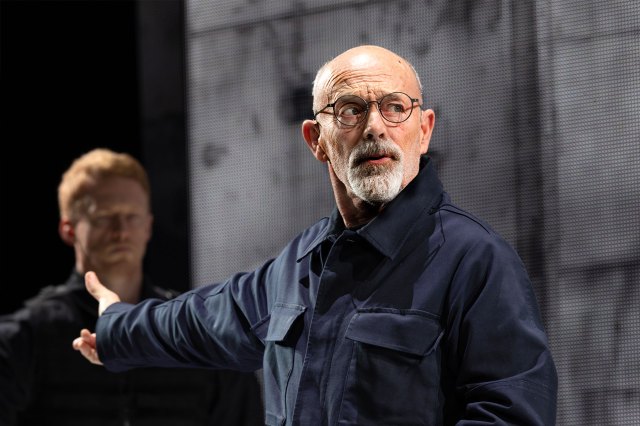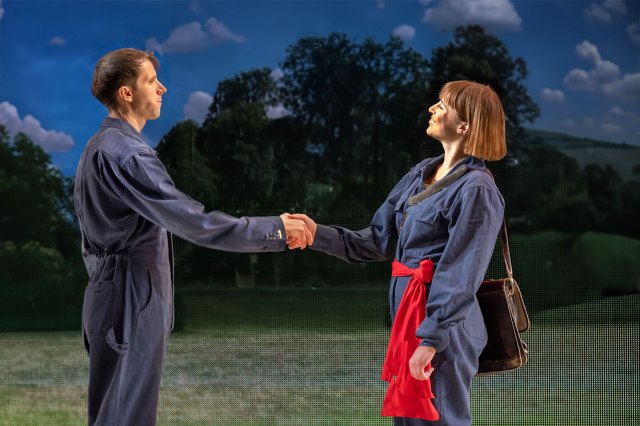George Orwell’s 1984 at Theatre Royal Bath and on tour – review
Lindsay Posner’s production tours throughout England until 23 November

It’s a decade since new kids on the block Robert Icke and Duncan McMillan took on George Orwell’s last magnum opus and delivered it from Nottingham to the Great White Way. Beware the great adaptations, that production, which took 1984 and spun it out in surprising and novel ways, sits as a heavy albatross around the neck of this new reworking from Ryan Craig.
There is nothing particularly wrong with Craig’s take on the material or Lindsay Posner’s solid production and you can feel the money rolling in from school groups looking to see this prescient novel staged. Yet with Icke and McMillan’s version still fresh in this critic’s mind, it never marks out its territory or makes a case for why this adaptation, today. In short, it’s a faithful retelling of the story that will play well for those looking for a solid dramatisation, without reaching its theatrical potency.
The rebellion of mild-mannered Winston Smith and his colleague-turned-lover Julia is well known, as rebellion ferments before authority squashes it out. It’s an effective narrative hook, opening with scenes of freedom and hope before gradually turning the screws mercilessly as independent thought is crushed out. Posner’s production clearly charts the path, his filmic staging, cutting to multiple interior and exterior locations with a graphic projected onto the stage letting us know where we are, while Justin Nardella’s video design gives us a clear evocation of sun-drenched forests where dangerous thought and a new world can be dreamt up.
Nardella’s work is the production’s high point. Big Brother is constantly watching and the screens here are in perpetual motion, projecting several familiar TRB unofficial rep members including Finbar Lynch, Mathew Horne, and Nicholas Woodeson in the role of company members interacting with Mark Quartley’s deflated Winston, and providing graphic novel images as the two lovers lie in post-coital communion. Video design has become de-rigueur in our contemporary theatre scene but if any production justifies the use of video, it’s this one. With the wings stripped back to the theatre walls, political members sit on chairs around the side of the space observing what’s happening around them.

Yet its first half fails to ignite. This has to do with the lack of chemistry between its two leads. Quartley is mesmerising as Winston, early on showing the bored disdain he has for his day job, his professional competencies almost make him vanish into the political echo chamber he helps prop up. Yet Eleanor Wyld as Julia, a fine actress though she has shown herself previously, has a blankness in performance that feels like she has been broken by the system long before she is. There is no sense of the illicit nature of both their trysts and the rebellious words sprouting forth from their lips. Without a convincing love affair, it becomes difficult to see why they risk all. It distances the work.
Thankfully the second half works its dreadful spell. The scenes of torture as Keith Allen’s O’Brien slowly brings Quartley to the company’s side are eye-wateringly conveyed, consistently pulling away just as it becomes too much. Allen dials down the psychotic rage he has previously shown in some of his villains. His O’Brien is a more bespectacled, rational thinker, especially chilling because he commits violent acts with a composed aura that suggests this is just another afternoon for him. Room 101 plunges us into darkness, it’s the aural nightmare that finally breaks defiance once and for all. Quartley, naked and beaten, is hypnotic, a performance of striking vulnerability, emotionally and physically.
David Birrell also convinces as family man Parson, a loving father who also realises his child can be used as a weapon against him. It’s a performance much like the production, well done without offering much new insight, one that will offer much sustenance to those seeing Orwell’s work for the first time, without being able to shift memories of a superior version that showed how adaptations in theatre can be done.















